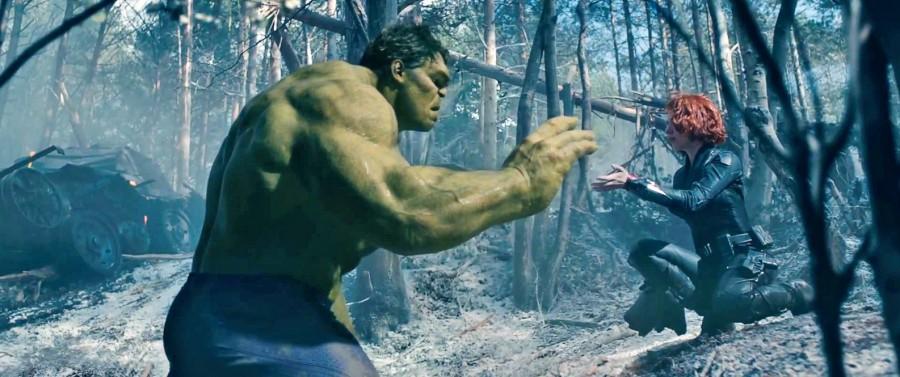OPINION: Black Widow is still a feminist character in Avengers: Age of Ultron
SPOILER ALERT! This opinion contains spoilers for the film
May 13, 2015
 “Avengers: Age of Ultron” has garnered criticism due to the love affair between Bruce Banner (The Hulk played by Mark Ruffalo) and Natasha Romanoff (Black Widow played by Scarlett Johansson) being considered unfeminist.
“Avengers: Age of Ultron” has garnered criticism due to the love affair between Bruce Banner (The Hulk played by Mark Ruffalo) and Natasha Romanoff (Black Widow played by Scarlett Johansson) being considered unfeminist.
Critics claim that Romanoff was reduced to a simple love interest, therefore ruining the only female character on the Avengers’ team.
So, are Banner and Romanoff ruining feminism one long glance at a time?
I am a feminist. I staunchly defend women’s rights and often talk about female representation in comics, movies and the like.
 But I really have to disagree with my fellow feminists here—Romanoff was not “reduced” to love interest status; Banner was.
But I really have to disagree with my fellow feminists here—Romanoff was not “reduced” to love interest status; Banner was.
Banner is bashful in the movie; he doesn’t know what to do with the fact that Romanoff is actively pursuing him.
She flirts with him, gets into his personal space, jokes that she should have joined him in the shower. Banner blushes and stammers, awkwardly unsure of what he should do about it.
It’s a complete role-reversal as women are traditionally told to wait to be pursued and remain chaste otherwise.
In the party scene, he shyly responds to her flirting with his own, then quickly backpedals because there’s something inside him that he’s afraid of: The Hulk.
The giant green rage monster could endanger Romanoff’s life if things got dicey.
The Hulk is a monster that Banner struggles to restrain. But who helps him control the monster? Romanoff.
Together they came up with a “lullaby” which is a series of actions that he and Romanoff perform in order to quell The Hulk and bring Banner back.
Why would Romanoff help?
Aside from being a friend and teammate to Banner, there’s also a monster within her. As Black Widow, Romanoff had committed horrendous acts—she’s even murdered children.
She is a lethal spy with red in her ledger that she desperately wants to absolve.
In other words, Romanoff is responding to his literal monster with her metaphorical one.
Her other teammates, which easily could have been written as love interests for her, all have past sins, but nothing that compares to her own. Nor do they show strong shame, instead reveling in a good fight.
On the other hand, Banner is a pacifist. He is reluctant to become The Hulk, and he is also open in his guilt for the innocent people that have been slaughtered or injured by his beast. Romanoff is responding to that because she’s been there, she can help. She knows what that guilt feels like.
It would be unfeminist if Romanoff needed to have a relationship.
If she wanted to “fix up” a bad boy just like in any other romantic drama, or if she ever excused his violence because he’s just “a good person,” which is uncomfortably close to romanticizing domestic abuse.
She never once defines herself as needing anyone else. She does not want to “fix” Banner. She does not excuse his violence. Instead, she tries to get him to become a better person on his own.
Banner is in desperate need of saving from himself, and she understands. They both are monsters. She wants him to confront his monster and control it instead of hide from it. She’s controlled her own and knows he can too.
Yet, in the end, she chooses being a hero over their relationship. She chooses to save lives rather than be happy with the man she loves because he chooses to run and she can’t.
Is that not feminist?
